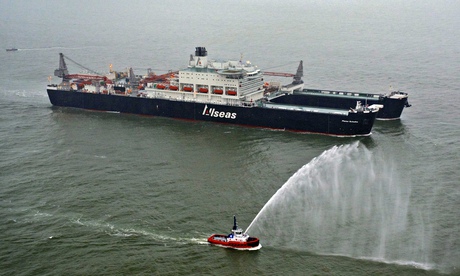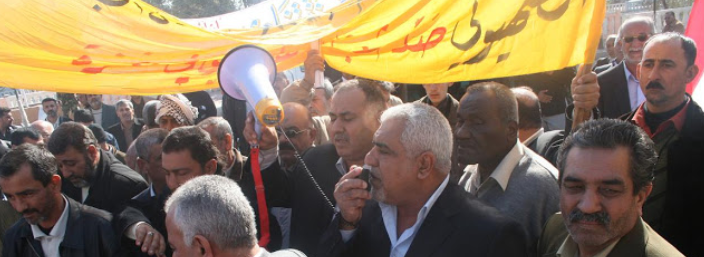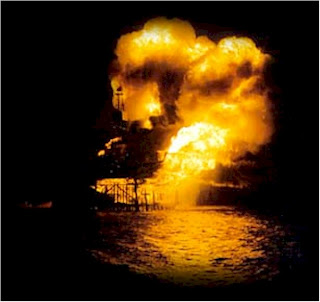What the Frack's Going On?
WHAT is going on about "fracking"? Last week MPs overwhelmingly rejected a bid to impose a moratorium, suspending fracking for shale gas, although the government agreed to Labour proposals for 13 new conditions to be met before shale gas extraction can take place. Environmental campaigners and residents of areas threatened by "fracking" operations were dismayed, so were many trade unionists unconvinced that the damage "fracking" can cause will be outweighed by any new jobs.
During the Commons debate government ministers also pledged an "outright ban" on fracking in national parks. Earlier, a committee of MPs called for a moratorium on the practice on the grounds that it could derail efforts to tackle climate change. The Environmental Audit Committee also warned that there were "huge uncertainties" about the environmental impact of fracking.
http://www.bbc.co.uk/news/uk-politics-30993915
If you believe the Daily Mail version of events, mind, what happened was that Labour has hamstrung hopes of a great gas boom (perhaps an unfortunate phrase) by imposing its tough new rules, solely for fear of losing votes to the Greens. Well, we are near election time, though anti-fracking campaigners had been hoping for a moratorium, and the Scottish government has just announced one. We have to admire the Tory tabloid's bravado if it thinks unrestricted fracking could be popular, when some of the most militant opposition has come from homeowners in leafy Tory constituencies.
http://www.dailymail.co.uk/news/article-2927603/Labour-puts-brake-fracking-Hope-new-gas-boom-dealt-blow-MPs-vote-raft-tough-regulations-shale-drilling.html
http://www.theguardian.com/environment/2015/jan/28/scotland-announces-moratorium-on-fracking-for-shale-gas
http://news.scotland.gov.uk/News/Moratorium-called-on-fracking-1555.aspx
"Fracking", or hydraulic fracturing is a technique whereby oil or gas are extracted by drilling down to shale rocks, then forcing a mixture of water, sand and chemicals at high velocity into the crack to force the oil and gas up to the surface like an artificial gusher. Proponents say it it is a cheapway of obtaining hydrocarbon fuels, and reducing the need for imports.
Opponents warn it can have a serious impact on the environment, risking contamination of ground water, depletion of fresh water, degradation of the air quality, bringing noise pollution and potentially triggering earthquakes. A company fracking off Lancashire's Fylde coast had to suspend operations in 2011 after the second of two minor earthquakes hitting Blackpool.
http://www.theguardian.com/uk/2011/jun/01/blackpool-earthquake-tremors-gas-drilling
An anti-fracking movement has grown up internationally, with major protests in affected parts of the United States, and a couple of years ago in the West Sussex village of Balcombe, where worried residents welcomed campaigning "eco warriers" coming to reinforce their fight. The local Labour Party congratulated the protesters. The Labour Representation Committee(LRC) in Sussex carried on the campaign against fracking.
https://www.youtube.com/watch?v=WJiH1g79Pew&feature=youtu.be
Fracking was banned in France in 2011 after public pressure. The government decided any economic advantage would be outweighed by the cost of preventive measures to protect the environment. The ban was upheld by an October 2013 ruling of the Constitutional Council following complaints by US-based Schuepbach Energy.
In Germany, government plans to permit fracking were cancelled within a month because of massive opposition from the public, the opposition parties, and some members of Chancellor Merkel's own CDU party. A moratorium was declared, and since then shale gas fracking has been effectively banned in Germany.
In the United States, the state of Vermont became the first to outlaw fracking in May 2012, and this was followed on December 17,2014 by the state of New York. There have even been moves to ban fracking in oil-rich Texas.
Doubts have been raised about the economic value of fracking,particularly when we see oil prices falling, though obviously the companies engaged in it see profits for themselves. Some of the companies in the USA have engaged former military psy ops officers to counter public opposition. Some in government there and perhaps here support fracking not for mere economic reasons but as part of a strategy to strengthen the West against Russia and Middle East countries. The new Cold Warriors charge that opposition to fracking is being funded or even masterminded by Russian oil and gas producer Gazprom.
Unfased by such accusations, there were environmental protests outside Parliament last week, as MPs gathered to debate fracking legislation in the government's Infrastructure Bill. There had been fears that the same government which criminalised squatting intends to legalise trespass for companies wishing to drill under people's homes.
http://www.theguardian.com/environment/2014/jun/04/plan-fracking-firms-drill-homes-queens-speech
Besides the dangers to the environment and health, MPs have voiced concern at the impact fracking has on climate change,both by the release of methane in the operation itself, and the effect of increasing hydrocarbon fuel use.
In the Commons, committee chair Joan Walley backed an amendment tabled by a cross-party group of MPs calling for fracking to be suspended for up to 30 months while an assessment is carried out. s
But the measure did not attract front-bench support and was defeated by 308 votes to 52. Labour's amendment was added to the bill, to loud cheers from opposition benches, which would impose 13 tests to be met before fracking. These include the completion of an environmental assessment and the need to consult residents on an individual basis.
http://www.bbc.co.uk/news/uk-politics-30993915
Those who have ever experienced "consultation" by employers and government will have their own opinions of what value to attach to that.
What happened to the call for a moratorium?
Here's the Lib Dem MP for Wells, Tessa Munt, who described fracking policy as "irresponsible", "high risk" and "undemocratic", and said she would quit the government on the issue:
Yesterday I joined 51 colleagues and, confirming my opposition to fracking in Somerset on principle, I rebelled against the Government, voting for a moratorium - or 'freeze' - on fracking.http://www.tessamunt.org.uk/no_fracking
Unfortunately, the Labour Party sat on its hands and didn’t vote for the moritorium, although it claimed it was supporting this as endorsed by the Environmental Audit Committee’s Report published yesterday morning.
Interestingly, it was reported in the Times on Monday that two of Britain’s biggest unions – the GMB and Unite - weighed in yesterday morning, begging Labour MPs not to support a ban on fracking. This may go some way to explaining the confusion over what was happening in the House of Commons and Labour’s 180˚ about-turn.
The MP, who delivered a petition to Number 10 Downing Street with a total of 8,688 Somerset signatures calling for a fracking freeze altogether, accepted that Labour's amendments were an improvement on the government's bill, but goes on to say: "Disappointingly, Labour called for two other votes during the short debate on the ‘fracking’ part of the Bill, the effect of which was not to allow time for any votes on the proposed changes to the trespass laws".
It was a report in the business freeby City AM which cited Tessa Munt herself as the source of the remark about trade unions,which had trade union activists asking what the hell was going on? When had union members been asked if they supported fracking?
http://www.cityam.com/208130/unions-helped-save-fracking-ban
We know that 'Progress', the business-funded Blairite faction within the Labour Party had sneered at the Balcombe 'eco-warriors' and called for a "healthy debate" about fracking before trade union and Labour conferences last year.
http://www.progressonline.org.uk/2013/09/09/wil-labour-learn-to-love-fracking/
See also:
http://www.leftfutures.org/2011/09/labours-party-within-a-party-latest-funding-figures/
On May 23 last year the GMB union carried an article on its website quoting Gary Smith, national officer for energy, "This whole issue of fracking needs to be subject to an honest and rational debate that focuses on a plan for energy, including gas in the UK".
Criticising government plans for compensation, the article said: "This is a case of the Tories lining up big bribes for their supporters in their heartlands where the reserves are supposed to be." It went on to say: "The case for fracking is yet to be proven either on environmental or economic grounds. There will be a major debate on the issue at GMB Congress next month".
http://www.gmb.org.uk/newsroom/debate-not-bribes-needed%20-on-fracking
The GMB conference in Nottingham in June did pass a resolution on fracking,though I have been scouring the union's web pages,so far without success,to see what it actually said. Some local trades union councils in areas affected by fracking have been actively campaigning against fracking together with residents and environmental activists, and last year's conference of trades councils held in Cardiff on the weekend of June 14-15 passed a composite resolution from Suffolk and Greater Manchester, dealing with climate change and fracking.
Part of this read:
"Conference is further concerned by the extreme energy extraction methods such a hydraulic
fracturing or “fracking” and the extraction of unconventional gas, such as coal bed methane and shale gas which have the potential to increase global warning as well as creating other
environmental damage and contaminating water supplies".
Condemning the government's "dash for gas" and encouragement of fracking, the resolution pledged among other things to "Campaign against fracking and the extraction of unconventional gas, such as coal bed methane and shale gas"
http://www.tuc.org.uk/regions/union-issues/unions-community/trades-councils/2014-trades-union-council-conference
http://www.tuc.org.uk/sites/default/files/Resolutions.pdf
Towards the end of that debate a delegate from the West Country took the mike to say that he understood the GMB union had come out in favour of fracking, and ask whether anybody from that union would care to say anything about the motion. Nobody took the bait. To be fair, delegates at conference represent their trades council, not their individual union, and are rank-and-file union members, not union officials, so not obliged to defend their union's policy. All the same, it is striking on reflection that nobody came forward to do so.
Nor did the GMB have much to say when the TUC in September discussed trades councils' representation. This had been raised the previous year in a resolution moved by Bob Crow of the RMT, but with him out of the way, some union leaders seem to have felt they could bury the issue as well. It was left to representatives of two small unions -the teachers'and lecturers' ATLand the Society of Physiotherapists, to express misgivings about the trades council resolution, but when the chair called a card vote it appeared the much larger GMB and Unison had voted against it.
Meanwhile at its conference opening at the end of June, Unite, Britain’s largest union, with over 1.5 million members, re-affirmed its opposition to fracking, and said it would use its influence to prevent fracking operations, and advise its members not to work on fracking sites, or deliver materials to such operations. Unite's resolution specifically called for a moratorium on fracking, and said it would
encourage the Labour Party and Labour Councils to take actions formally opposing fracking. The union pledged itself to support local anti-fracking groups, help with funding, and encourage members at all levels of the union to link up with local campaigners.
http://greenleftblog.blogspot.co.uk/2014/07/unite-union-has-today-re-affirmed-its.html
http://www.unitetheunion.org/uploaded/documents/Decisions%20of%20the%20Policy%20Conference%20201411-21375.pdf
See also:
http://www.morningstaronline.co.uk/a-0e12-Unite-activist-stands-by-convicted-anti-fracking-son#.VM3uii6E1Nl
Which suggests that union officers may not all have been so keen.
So the report that Unite had joined GMB in calling for support to the tracking bill and not a moratorium has had Unite members clamouring to know how this could be, and what is going on?
So far a Unite officer has assured us the story is untrue, though we're waiting for an official statement.
The GMB did submit a letter, and it is on parliamentary records, calling for support to the government's bill. Our friend Gary Smith, GMB National Secretary for Energy and Utilities, says in the letter “The truth is this country will be using gas for many years to come and this throws up the challenge of where we get our gas from and whether we can use gas in a better way.
Having access to gas is a matter of national security. It also raises important moral issues that are yet to be debated properly; is it really right that we import gas from places like Russia or the Middle East, with all the environmental consequences transporting gas across oceans and continents has? Can it be right that we increasingly depend on gas from countries with regulatory and environmental standards lower than ours and where people don't have rights to object or protest, much less join unions?
http://www.gmb.org.uk/newsroom/mps-should-back-infrastructure-bill
Though affecting concern for workers' rights elsewhere,this does not say what the union is going to do to assist them. It could almost be interpreted as telling us "You would not have the right to protest in Saudi or Russia, so don't expect it here". But its main thrust is that talk about "national security", behind raising "moral issues". This is similar to the way some US congressmen talk, and we know that when great powers turn to autarchy, and "self-reliance", that's not instead of, but preparatory to,war.
It is also reminiscent of the bad old days when unions like the GMB, affiliated with Public Service International, were implicated in acting as channels for the influence of the Central Intelligence Agency and MI6. With the GMB and its members fighting for working class interests on so many fronts, against austerity and blacklisting for a start, we thought class collaboration was a thing of the past.
But not content with influencing parliamentary votes, GMB was holding a conference to promote fracking on Friday, in Blackpool, where local trade unionists have been campaigning against. That's risking another earthquake, I'd say!
Labels: Environment, oil, trade unions.










